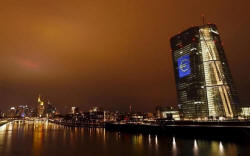|
 ECB
has policy options left, but inflation outlook
unchanged: Reuters poll ECB
has policy options left, but inflation outlook
unchanged: Reuters poll
 Send a link to a friend
Send a link to a friend
[March 16, 2016]
By Sumanta Dey
(Reuters) - The European Central Bank still
has policy options left at its disposal, according to a majority of
economists in a Reuters poll, who also said President Mario Draghi has
not lost his knack for influencing financial markets.
|
|
 Thirty-five of 44 economists polled this week answered "No" when
asked if the ECB had effectively depleted its monetary policy
arsenal. Thirty-five of 44 economists polled this week answered "No" when
asked if the ECB had effectively depleted its monetary policy
arsenal.
This follows Draghi's most aggressive policy easing ever, cutting
all three key interest rates and making the deposit rate more
negative, as well as increasing monthly bond purchases by a third
and introducing new incentives for banks to loan money.
Asked what else the ECB could do, most economists said more of the
same. It could increase monthly bond buying, buy various other kinds
of debt and take interest rates deeper into negative territory -
even though virtually no evidence exists that such policies have
helped to boost inflation, currently negative, to the ECB's target
of just below 2 percent.

Just one-third of economists who answered another question said
Draghi's influence on markets had waned, but as a whole they have
barely changed their outlook for growth and inflation over the next
two years compared with last month.
It is a common problem facing many economies.
"Monetary policy is still doing pretty much all of the heavy lifting
as many of the economies have already stretched themselves on the
fiscal front," said Radhika Rao, economist at DBS Bank. "While more
action is likely, financial markets and demand conditions have grown
immune to the plethora of measures."
Some of the largest banks such as Deutsche Bank, Goldman Sachs and
JPMorgan have steadily lowered their 2016 growth predictions for the
euro zone over the past six months, even as the ECB ramped up its
stimulus.
[to top of second column] |

The most optimistic outlook for 2017 growth was just one-tenth of a
percentage point higher compared with the last survey.
Euro zone economic growth is expected to be a lackluster 0.4 percent
in each quarter until mid-2017, unchanged from last month's poll.
For all this year, it is expected to average 1.5 percent, down from
1.6 percent in February's poll. The highest call of 1.9 percent is
unchanged since last month.
Economists stuck to their view that inflation will remain tepid
through this year and next.
For 2016, inflation is expected to average just 0.3 percent - the
lowest consensus expectation since polling on the period began two
years ago. Next year, inflation is likely to average 1.4 percent,
similar to February's survey.
(Reporting by Sumanta Dey; Analysis by Shrutee Sarkar; Polling by
Khushboo Mittal; Editing by Larry King)
[© 2016 Thomson Reuters. All rights
reserved.] Copyright 2016 Reuters. All rights reserved. This material may not be published,
broadcast, rewritten or redistributed.
 |